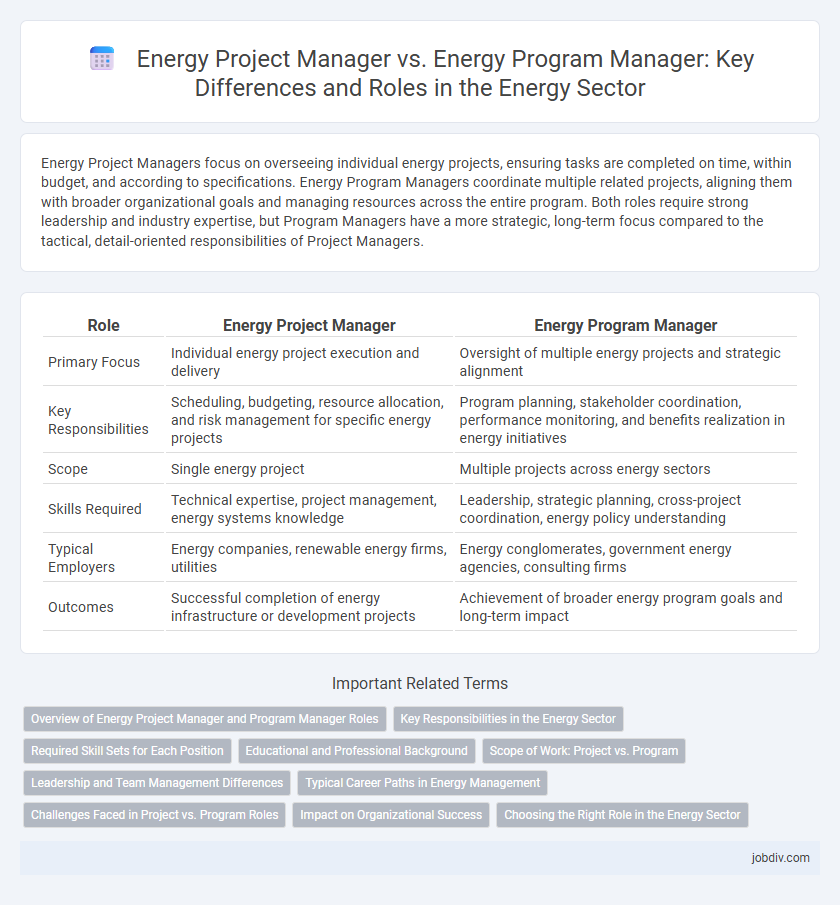Energy Project Managers focus on overseeing individual energy projects, ensuring tasks are completed on time, within budget, and according to specifications. Energy Program Managers coordinate multiple related projects, aligning them with broader organizational goals and managing resources across the entire program. Both roles require strong leadership and industry expertise, but Program Managers have a more strategic, long-term focus compared to the tactical, detail-oriented responsibilities of Project Managers.
Table of Comparison
| Role | Energy Project Manager | Energy Program Manager |
|---|---|---|
| Primary Focus | Individual energy project execution and delivery | Oversight of multiple energy projects and strategic alignment |
| Key Responsibilities | Scheduling, budgeting, resource allocation, and risk management for specific energy projects | Program planning, stakeholder coordination, performance monitoring, and benefits realization in energy initiatives |
| Scope | Single energy project | Multiple projects across energy sectors |
| Skills Required | Technical expertise, project management, energy systems knowledge | Leadership, strategic planning, cross-project coordination, energy policy understanding |
| Typical Employers | Energy companies, renewable energy firms, utilities | Energy conglomerates, government energy agencies, consulting firms |
| Outcomes | Successful completion of energy infrastructure or development projects | Achievement of broader energy program goals and long-term impact |
Overview of Energy Project Manager and Program Manager Roles
Energy Project Managers oversee specific energy initiatives, ensuring project timelines, budgets, and resource allocation are met to achieve targeted outcomes in renewable or traditional energy sectors. Energy Program Managers coordinate multiple related projects, aligning them with broader organizational energy goals, policy compliance, and long-term sustainability strategies. Both roles require expertise in energy management, regulatory frameworks, and stakeholder communication, but Program Managers focus on strategic oversight whereas Project Managers handle operational execution.
Key Responsibilities in the Energy Sector
Energy Project Managers oversee the planning, execution, and completion of specific energy initiatives, managing budgets, timelines, and team coordination to ensure successful project delivery. Energy Program Managers coordinate multiple related projects, aligning them with strategic goals, optimizing resource allocation, and managing stakeholder communications across the broader energy portfolio. Both roles require expertise in energy regulations, sustainability practices, and technical knowledge of energy systems to drive efficient and compliant energy solutions.
Required Skill Sets for Each Position
Energy Project Managers require strong skills in project planning, budgeting, risk management, and resource allocation, with a focus on successfully delivering specific energy projects on time and within scope. Energy Program Managers need expertise in strategic planning, stakeholder coordination, portfolio management, and performance tracking to oversee multiple interconnected energy projects ensuring alignment with broader organizational goals. Proficiency in energy regulations, technical knowledge of renewable and conventional energy systems, and leadership capabilities are critical for both roles but with differing emphasis on detail-oriented execution versus big-picture strategy.
Educational and Professional Background
Energy Project Managers typically hold degrees in engineering, environmental science, or energy management, paired with certifications like PMP to oversee individual energy projects effectively. Energy Program Managers often possess advanced degrees such as an MBA or a Master's in Energy Policy, combined with extensive experience managing multiple, coordinated projects within large-scale energy initiatives. Both roles require strong technical knowledge, but Program Managers emphasize strategic planning and cross-project leadership skills in energy development.
Scope of Work: Project vs. Program
An Energy Project Manager oversees the execution of individual energy projects, ensuring timely delivery, budget adherence, and specific technical objectives within a defined scope. In contrast, an Energy Program Manager coordinates multiple related energy projects to achieve broader strategic goals, managing interdependencies, resource allocation, and long-term impact. The scope of an Energy Project Manager is focused on detailed project planning and execution, while the Energy Program Manager handles overarching program direction and alignment with organizational energy initiatives.
Leadership and Team Management Differences
Energy Project Managers focus on leading specific energy initiatives by directly managing project teams, timelines, and resources to ensure successful completion of individual energy projects. Energy Program Managers oversee multiple interconnected energy projects, providing strategic leadership to coordinate cross-functional teams and align efforts with broader organizational energy goals. The key difference lies in the scope of leadership, with Project Managers managing tactical execution and Program Managers driving strategic team management across diverse energy portfolios.
Typical Career Paths in Energy Management
Energy Project Managers often advance through roles emphasizing technical expertise and hands-on project delivery within renewable energy installations or infrastructure upgrades. Energy Program Managers typically have backgrounds in strategic planning, policy development, or portfolio oversight, progressing towards leadership positions that coordinate multiple related projects across organizations or regions. Both paths can converge into executive roles such as Director of Energy Management or Chief Sustainability Officer, requiring robust knowledge in energy market trends, regulatory compliance, and stakeholder engagement.
Challenges Faced in Project vs. Program Roles
Energy Project Managers face challenges in managing specific project scopes, timelines, and budgets while ensuring compliance with regulatory standards and technical specifications. Energy Program Managers tackle broader challenges involving coordination across multiple related projects, aligning strategic objectives, resource allocation, and stakeholder communication for long-term energy initiatives. Both roles demand robust risk management but differ in scale and complexity of operational oversight in renewable energy, fossil fuels, and grid modernization projects.
Impact on Organizational Success
Energy Project Managers drive specific initiatives such as renewable installations or efficiency upgrades, ensuring timely delivery within budget while meeting technical standards. Energy Program Managers oversee multiple related projects, aligning them with strategic organizational goals to maximize long-term sustainability and cost savings. Their combined expertise enhances operational efficiency, regulatory compliance, and innovation, significantly impacting organizational success in the energy sector.
Choosing the Right Role in the Energy Sector
Energy Project Managers focus on overseeing specific energy projects from initiation to completion, managing schedules, budgets, and resources to ensure successful delivery. In contrast, Energy Program Managers coordinate multiple related projects, aligning them with broader strategic goals and optimizing resource allocation across the portfolio. Choosing the right role depends on whether you prefer hands-on project execution or strategic oversight in the energy sector.
Energy Project Manager vs Energy Program Manager Infographic

 jobdiv.com
jobdiv.com